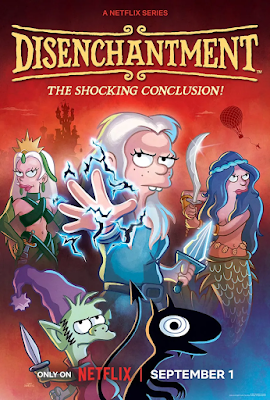Disenchantment Goes Out with a Whimper
At this point, Disenchantment feels like a failed experiment. It sounded like a great idea at first. Using Matt Groening's irreverent humor to deconstruct modern princess stereotypes could have gone in the way of a cleverly nuanced series like Crazy Ex-Girlfriend. Instead, it tried to recreate outdated techniques from shows like The Simpsons that were made for syndication. By releasing entire seasons all at once with a year between each one on Netflix, Disenchantment needed to break the mold to match its new format, and it could not do that. Each season or "part" of the series had a bunch of irrelevant or mediocre episodes in between finales that would barely advance the plot and end on cliffhangers, requiring viewers to wait a full year to find out what would happen next. Even though this final installment cleverly included a background character who would pointed out these inconsistencies, it wasn't enough to save the show.
Part 5 of Disenchantment begins with a chaotic mess in which everyone thinks Bean is dead after she is secretly rescued by her mermaid girlfriend, Mora. Meanwhile, her wicked mother, Queen Dagmar, frantically tries to track down the severed head and body of the evil clone that she created of her rebellious daughter to do her bidding. The first half of the season focuses on Bean's relationship with Mora as she comes to terms with her queer romantic desires as well as her foreboding destiny as the daughter of a powerful queen. Elfo and Luci don't have as much to do in this season, but they both come to terms with who they are and what they've learned about themselves over the course of the show. Elfo teams up with Mop Girl, a scullery maid who works at the castle and turns out to be quite the Mary Sue. Ultimately, the season wraps with a satisfying ending for the show, but the episodes leading up to it are a slog of a binge with very few significant developments to offer.
One highlight of the first few episodes is the disability inclusion revolving around Bean's lesbian relationship with Mora. Since Mora is a mermaid and has no way to travel on land, Bean must carry her around from location to location. There is even an awkward conversation in which Bean comments about whether it would be better for Mora to be a complete woman or fish, and Mora teaches to be more sensitive around people who are different and accept them for who they are. Whether or not this was intended as a lesson for disability inclusion is debatable, but it worked well nonetheless. As someone who loves mermaids in general, I was pleased to see Mora get so much screen time at the beginning of the season and disappointed when it was abruptly cut off after a few episodes. The later episodes that focused on this universe's theology and afterlife were difficult to sit through and had very little payoff. While the show had a neat resolution that tied everything up with a bow, it never felt fully earned.
One of the things that I would have liked to see explored in this final chapter is Bean's relationship with her mother. Every part of the show teases its audience with hints of what it was like for Bean to grow up with a wicked mother and miss all the signs of it as a child, but it's never fully explored. Both characters' motivations remain flat and murky by the end of the show. This was the element that interested me the most about this show because it was something unique that had never been done before with princesses in fantasy worlds. Most Disney princesses lost their mothers at a very young age, and those who didn't have strong relationships with them. Bean is unique as an animated princess because she has no idea how to act like one and struggles with her identity due to her strained relationship with her mother. There was a lot of potential to explore that in this final batch of episodes, but the show lazily slogged its way to a proper conclusion without taking the time to fully explore any of the characters' relationships that have been built up over the past five years.
Disenchantment's journey as a series ultimately feels like a missed opportunity. It seemed clever in theory by using Matt Groening's irreverent humor to deconstruct modern princess stereotypes, but it fell short. Instead of breaking the mold and adapting to its new format of releasing entire seasons on Netflix, Disenchantment tried to replicate outdated techniques from shows like The Simpsons or Futurama. Each season had episodes that barely advanced the plot, filled with irrelevant or mediocre storylines, leading to frustrating cliffhangers. In the final installment, while there were some satisfying moments and resolutions, the overall experience was underwhelming. The show failed to fully explore key relationships, particularly Bean's complicated dynamic with her wicked mother, and it lacked the earned payoff for viewers after investing in the series for five years.












Comments